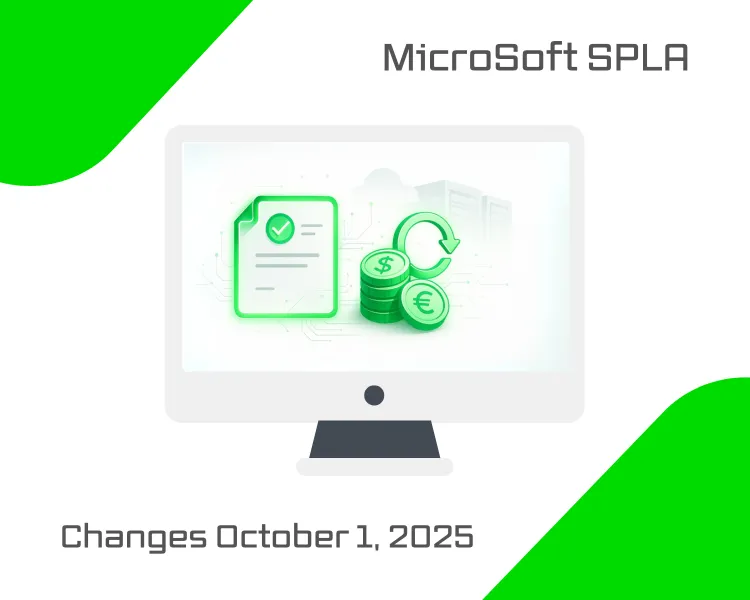
Microsoft is enforcing licensing updates on October 1, 2025, that tighten the licensing requirements for Windows Server and Remote Desktop Services (RDS) in public cloud environments. If you run or procure Windows/RDS workloads on hyperscale clouds, this affects your architecture, budgeting, and compliance posture.
The headline: SPLA can’t be used on “Listed Providers”
From October 1, 2025, service providers cannot use their own SPLA (Service Provider License Agreement) licenses on the big public clouds—Microsoft’s so-called “Listed Providers”: AWS, Microsoft Azure, Google Cloud, and Alibaba Cloud. Any SPLA-based Windows Server or RDS usage on those clouds must be transitioned by September 30, 2025. After that, SPLA on those platforms is out of compliance.
What’s still allowed on those clouds: you can continue with license-included images/services (i.e., the cloud provider supplies the Microsoft license as part of the VM/service price) or, in narrowly defined cases, BYOL on dedicated hosts with proper volume licensing rights—not SPLA. Expect higher costs and stricter conditions versus many legacy SPLA models.
Where Windows Server is prohibited (post-deadline)
-
Prohibited: Running Windows Server on AWS/Azure/GCP/Alibaba while covering it with your provider’s SPLA. (This includes multi-tenant shared hosts and still applies even if you rent dedicated capacity from those listed clouds.)
-
Permitted alternatives on those clouds:
-
License-included Windows Server images from the cloud provider.
-
BYOL on dedicated hosts (e.g., AWS EC2 Dedicated Hosts) with valid volume-licensing/Software Assurance rights and compliance with Microsoft’s outsourcing rules. SPLA does not apply here.
-
For detailed, current Windows Server licensing constructs (e.g., per-vCore options, pay-as-you-go via Arc), refer to Microsoft’s licensing guides.
Where RDS is prohibited (post-deadline)
-
Prohibited: Using SPLA RDS SALs to license users connecting to RDS (Remote Desktop Session Host) hosted on AWS/Azure/GCP/Alibaba infrastructure after Sept 30, 2025. This shuts down the typical MSP pattern of hosting an RDS farm on a hyperscaler and reporting SPLA SALs on a monthly basis.
-
Important nuance: Traditional RDS CALs (volume licensing) lack license mobility to third-party, multi-tenant clouds. If you need session hosting in public cloud post-deadline, you’ll either:
-
Use Azure Virtual Desktop (AVD)–aligned entitlements on Azure (Microsoft’s own stack and licensing channels), or
-
Re-platform to license-included Desktop-as-a-Service offerings where available, or
-
Move the RDS farm to non-listed infrastructure (see next section).
-
Where SPLA continues to be allowed
Microsoft’s restriction targets only the Listed Providers. SPLA remains valid on non-listed hosters and on infrastructure that the provider owns and operates (breadth hosters/regional providers, private clouds in a provider’s data center, etc.). If your workloads run with a provider that is not reselling a hyperscaler and uses its own hardware/datacenters, SPLA-based Windows Server/RDS hosting continues past October 2025.
Planning checklist for IT admins
-
Inventory: Identify Windows Server / RDS instances running on AWS/Azure/GCP/Alibaba. Note how each is licensed.
-
Remediate: For any SPLA-covered workloads on Listed Providers, plan a change before Oct 1, 2025:
-
Migrate to license-included instances,
-
Shift to dedicated hosts with compliant BYOL (volume licenses + SA), or
-
Relocate to a non-listed hoster that can continue SPLA.
-
-
Budget: Expect potential cost increases moving from SPLA to license-included pricing on hyperscalers.
-
Document: Update internal standards so future builds don’t accidentally violate the post-2025 rules.
Specific to Bacloud customers: No impact
Bacloud clients are not affected by these prohibitions. Bacloud does not resell public cloud services from the Listed Providers. Instead, Bacloud uses its own infrastructure to deliver virtual and dedicated servers. Because the new Microsoft rules restrict SPLA to Listed Providers only, Bacloud can continue delivering SPLA-licensed Windows Server and RDS services on its own data center hardware without interruption. In other words, your existing and future Windows/RDS deployments on Bacloud remain compliant under SPLA after October 1, 2025.
